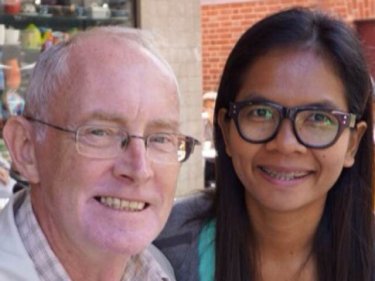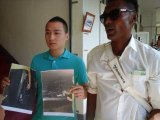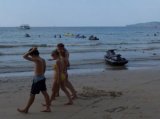''Thailand is where I live and I want the country where I live to achieve the right balance of democracy and media freedom,'' he told a gathering last night in Melbourne organised by the Melbourne Press Club.
He and his colleague, Chutima Sidasathian, received an enthusiastic reception for taking their stand in fighting criminal defamation and Computer Crimes Act charges brought on behalf of the Royal Thai Navy.
''This case began before the takeover in Thailand by the military last May,'' Morison said today. ''As we've said all along, we believe one or two officers have acted on bad advice and that the Royal Thai Navy is now suffering the consequences of criticism of the case. Phuketwan and Thailand are suffering, too.''
The Phuket-based online news site, which has won international praise for its coverage of the exodus of Rohingya boatpeople from Burma (Myanmar), has lost advertising revenue as a result of being sued by the Royal Thai Navy and may not survive.
''Every day poses new challenges for us,'' Morison said. ''But the principle of a free media is so important that we must continue to fight this case until we are exonerated. We have done nothing wrong.''
An officer acting on behalf of the entire Royal Thai Navy went to police over a paragraph that appeared on the site on July 17, 2013. The paragraph, quoted directly from a news feature on the Rohingya by two Reuters news agency reporters, soon after formed part of a series that won the prestigious Pulitzer Prize.
Reuters has not been prosecuted, not have several other Thai news outlets that published the same information.
''We have been singled out and we believe our seven-year coverage of the Rohingya issue and human trafficking in Thailand is the reason,'' Morison said.
He and his colleague have given several interviews while in Australia and will speak tonight to a group of journalism students and staff at Melbourne University.
The case against the Phuketwan pair was mentioned in last year's US State Department Trafficking in Persons report that lowered Thailand to Tier 3, the lowest level, and it is expected that the case will be mentioned again in this year's TiP report.
Morison and Khun Chutima are catching a flight back to Phuket tomorrow afternoon. Their trial, due to continue from July 14 at Phuket Provincial Court, is expected to bring international media attention. The pair could face long jail terms if convicted.
Ironically, earlier this week another Australian journalist, Peter Greste, was freed in Egypt after serving 400 days on trumped up charges laid against three Aljazeera network staff. He has since returned to Australia.
''I am sure that Peter Greste would understand why I have to go back to Thailand to fight this charge,'' said Morison, who won the temporary return of his seized passport to visit his ailing 91-year-old father. ''More than 100 journalists around the world are facing similar court action to silence them.''
Lawyers' Rights Watch Canada recently urged the Australian Government to speak out publicly in defence of Morison and seek the permanent return of his passport, which remains the property of the Australian Government.
A London-based NGO, the Media Legal Defence Initiative, is funding most of the Phuketwan journalists' legal costs and the Andaman Community Rights and Legal Aid Centre has provided the 100,000 bail required for each of them.
The Human Rights Lawyers Association of Thailand, iLaw and SR Law are providing defence lawyers.
The Australian Government
Former Ambassador to Thailand, James Wise: ''Normally, we take up issues like yours with our host government only after the person affected asks us to do so (especially when the case already has a high profile and we can be confident that the host government is aware of it). We would not want to cut across your own plans for managing the way you want to respond to the allegations against you - because, ultimately, how you manage your affairs is your business, not ours.''
United Nations
''Criminal prosecution for defamation has a chilling effect on freedom of the press,'' said Ravina Shamdasani, the spokesperson for the Office of the High Commissioner for Human Rights. ''International standards are clear that imprisonment is never an appropriate penalty for defamation.''
Human Rights Watch
''The Thai navy's lawsuit is a reckless attempt to curtail journalists' reporting on alleged human trafficking by its officers,'' said Brad Adams, Asia director at Human Rights Watch. ''Unless the government withdraws the case, its impact will be felt far beyond those reporting on abuses against the Rohingya - and could have a choking effect on all investigative reporting in Thailand.''
Reporters Without Borders
"It is intolerable that journalists are being prosecuted for just doing their job by relaying information of general interest that had already been made public," Reporters Without Borders said. "Bringing charges under the controversial Computers Crimes Act in a defamation case is indicative of the critical state of freedom of information in Thailand and amounts to an attempt to gag the media. We support these journalists, who are facing a jail term, and we call for the immediate withdrawal of these proceedings."
Committee to Protect Journalists
''Rather than shooting the messenger, the Royal Thai Navy would be better suited launching an internal investigation into the serious allegations of abuse that have been raised,'' said Shawn Crispin, CPJ's senior Southeast Asia representative. ''This type of legal intimidation aims ultimately at discouraging media reporting on allegations of serious human rights abuses.''
Chris Lewa, director of the rights group the Arakan Project
''Thanks to the fair investigative reporting by the Phuketwan journalists, the involvement of various Thai agencies in the massive smuggling and trafficking operations of Rohingya refugees and their related miseries is no more a secret. Rights groups should unite to call on Thailand to quash these defamation charges.''
Phuketwan
''We wish the Royal Thai Navy would clear its reputation by explaining precisely what is happening to the Rohingya in the Andaman Sea and in Thailand,'' Phuketwan said in a statement released in response to the charges. ''By instead using a controversial law against us, the Navy is, we believe, acting out of character.''
Bangkok Post
The action makes the navy look like a bully, and gives the impression the admirals would like to intimidate the media. Instead of defending the navy's honor, the criminal defamation suit holds it to question. Instead of silencing the media about the story - concerning the navy's role in the mistreatment of Rohingya boatpeople - the lawsuit repeats it, to more people and at greater length.
CNN
Morison said: "The navy's action over one paragraph has created a perfect storm. If the navy proceeds with the case, the Rohingya issue is now tied up in their action against media under a controversial law."
TIME
In the meantime, calmer seas mean that even more Rohingya are expected to attempt the treacherous journey in the weeks ahead. Nothing could gladden the traffickers more.
Reuters
Barb Burg, Reuters' (former) global head of communications: ''Our story was fair and balanced and Reuters has not been accused of criminal libel.''
Bill Barnett (The Phuket Insider)
The issues which have drawn Phuketwan into this fray are profound and disturbing. There should be no need to wax over reality and respect needs to be given to those who stand up for the helpless who cannot help themselves.
Andrew Drummond (Investigative Journalist)
We should all support journalists who are doing a difficult job here under laws which best suit a totalitarian state.
Excellence in Human Rights Reporting, Investigative Reporting awards
In 2010 the Phuketwan team shared the Society of Publishers in Asia Award for Excellence in Investigative Reporting and a second Award for Excellence in Human Rights Reporting, both with the South China Morning Post newspaper. Judges said of the Excellence in Investigative Reporting award: ''An excellent series that uncovered serious government abuses and had a material impact in correcting them. Exclusivity. Strong reporting. Hard-hitting piece with international implications.''
Of the Excellence in Human Rights Reporting award, the judges said: ''Excellent investigative work that exposed serious human rights abuses of oppressed people. Intrepid reporting of a hidden subject. This is a high-caliber series buttressed by solid on-the-ground reporting and great pictures. All militaries are challenging subjects for investigative reporters and Thailand's is no exception. The team clearly went to great lengths to get sources, break news, and provide the details that prodded the government into action.''












ego is not a dirty word !!
Posted by chris on February 5, 2015 13:12